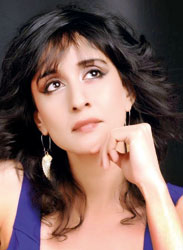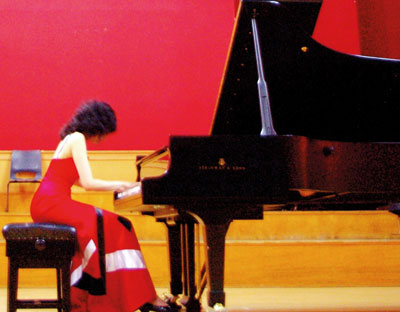If you think accomplishment in an unlikely combination of linguistics and music performance together with model-material looks, grace, candour and humility sprinkled with a few funny facts like ambidextrousness and synaesthesia is impossible in one person; Google Tanya Ekanayaka.
Her mother being a piano teacher and father an amateur violinist, it must have been inevitable that Tanya started piano lessons as young as five. But unlike for most of us, playing the piano – performing – was not just another extra-curricular activity for her, but the development of a relationship.
 |
| Tanya Ekanayaka |
“As performers we all go through stages when as much as you love to play and as important it is, you need to be away from it... Then you sort of run back and there’s a greater need and so much intensity!” she explains, the questioning look in her eyes swiftly replaced by a distinct sparkle.
It is probably this intimate relationship she has with the act of playing the piano itself that makes her performances so fluid, a seeming conversation between herself and the instrument. “I never stopped playing” we are emphatically told, “but there was a lull... God forbid a day when I can’t access a piano!”
Tanya doesn’t play the piano simply because she is phenomenally good at it or because she likes it, but in her own words, because she has to. “I need it -it sounds almost selfish to say that, but yeah...” Seemingly paradoxical for a linguist, Tanya believes she does not express herself all that much through language in the common sense. “It’s through my compositions that most of me is reflected” is her explanation. Those “most personal, intense, traumatic” experiences of Tanya’s life translate to her music, she says, certain original compositions of hers can be correlated to specific personal experiences. “[This] is why I can’t let go... It’s pure love; pure passion and drive.”
But as “essential [a] part of life” as music is to her, Tanya knew, and her parents recognized, that “from a practical point of view, it’s a very risky thing to make a career out of music – especially in this country.” And so, along came academia. Tanya’s father was a professor at the University of Peradeniya, and thus she grew up on the campus premises, constantly exposed to the “academic” kind of atmosphere of the place. Not a surprise then, that she was admitted to the English Honours programme at the university in 1999.
“Linguistics took hold of me,” she says, almost amazed by it herself. There is an unexpected bounce and care-freeness in the slight frame and flyaway hair as we chat on her verandah that contrasts completely with the obvious strength of her expressive hands and the intense involvement evident in her piano playing. And so with laughter and sparkly eyes is narrated the experience of undergraduate studies with well-known linguist Thiru Kandiah. “I was very fortunate, he really inspired me,” she enthuses. Unable to give up her first love, yet falling headlong into her academic interests, Tanya began at this stage to fuse language studies with music. Her undergraduate thesis was on a combination of the two, and earned her a place on the staff at the Department of English at Peradeniya soon after graduation.
“Oh, it was lovely!” she says of her first experiences as a lecturer, adding with laughter that she learnt more during this time “’cos they just put you in the deep end”. But it was “fabulous” she says to sit with Prof. Kandiah and have “long, long discussions about everything”. In 2007 Tanya was offered a scholarship to read for an MSc in linguistics at the University of Edinburgh. She has just finished writing her PhD thesis at Edinburgh, again bringing music and linguistics together in a study of language mixing in Sri Lankan pop-music.
Tanya has also continued to teach in the linguistics and music departments at Edinburgh and it was while practising on a piano at the department that she was heard by a more senior member of the staff and “quite by accident” launched into an international career in music performance.
Her performances gained Tanya the reputation that finally led her to the highlight of her career so far: becoming the first Sri Lankan to play in the ‘Pianists of the World’ series at St. Martin-in-the-Fields in 2010. “It was a huge honour,” she says quietly, humbly. The performance also marked the first occasion on which one of her compositions was part of the programme, as well as the first time a Sri Lankan composition was presented at that famed site. Since then, each of her concerts has featured an original composition (most of these – some found on YouTube – based on Sri Lankan tunes from her childhood). And these concerts too, have been many.
Despite these treasured achievements, Tanya’s heart was set on returning to Sri Lanka and her teaching position at the University of Peradeniya. And though she seems to deeply regret being unable to make it a reality yet, “I am determined to return,” she says. “I miss a lot” she explains, “I miss...the feeling of being home, because this is where my roots are.” She hopes that she will soon be able to perform in Sri Lanka, hinting that concerts with the Symphony Orchestra of Sri Lanka (SOSL) will probably be in her agenda in the near future, once she has completed a series of performances at “prestigious” venues in New York.
“I’ve always felt that in Sri Lanka people are very, very fond of music,” she laughs that it’s a silly thing to say. “There’s a real interest, even though there is – ironically – very little scope for someone to make a career out of it. People want to sing and talk about music in a very uninhibited sort of way... and I think that’s wonderful. And I think that is why there is a lot of talent here. It is sad though, that this whole classical music “business” is restricted to a certain class of people.” Tanya believes that if the musical sphere were to be opened up and broadened out, out of that would come the new sounds of our generation. “Of course it is inevitable that a lot of confused sounds will be emerging out of that endeavour, but that is natural, and you absolutely need it. Look at Bach and Beethoven – that’s what they did. They messed around with what was there before them, and made it their own and did something new – and it was new pop music at the time!”
As we talk music, linguistics, technology, boys, food, infection, philosophy and pop culture, the conversation keeps returning to what Tanya fondly and emotively calls “my home”. With her education, her experience, her stunning looks, her achievements and fame, one expects Dr. (yes, Doctor!) Tanya Ekanayaka to be overbearing and superior. But we find the opposite. The slim girl with the dainty step is still very much aware of where she comes from, and her character driven by two things: love of music and love of home. |



